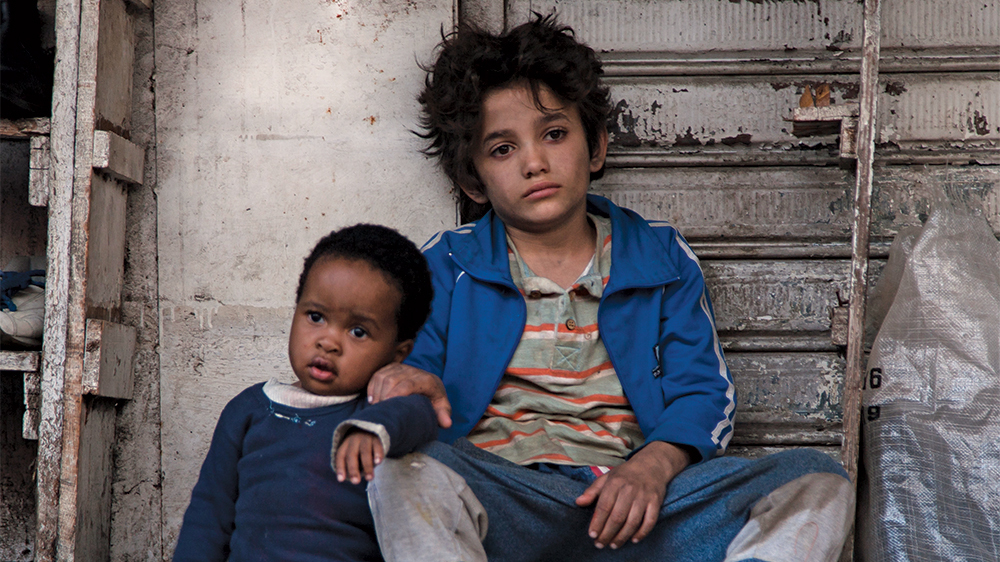CAPERNAUM (Chaos)
Sony Pictures Classics
Reviewed for Shockya.com by: Harvey Karten
Director: Nadine Labaki
Screenwriter: Nadine Labaki, Jihad Hojeilly, Michelle Keserwany, in collaboration with Georges Khabbaz and with the participation of Khaled Mouzanar
Cast: Zain Al Rafeea, Yordanos Shiferaw, Boluwatife Treasure Bankole, Kawthar Al Haddad
Screened at: Sony, NYC, 11/28/18
Opens: December 14, 2018
Next time a “homeless Vietnam veteran” enters your car in the New York City Metro asking for “a dollar, a quarter, even a penny to feed my three hungry kids,” are you tempted to say “If you’re too poor to take care of yourself, why the hell did you have three hungry kids?” (Ironically, Trump would not be tempted to say this, given that he opposes requiring health insurance companies to cover birth control.) The rich make money, the poor make children.
Homelessness and poverty are in no way intrinsic to New York or the U.S. but are more prevalent in what Trump might call sh*thole countries. Doubtless he’d include Muslim Lebanon, since that Middle Eastern state is no Norway, but while Beirut has a thriving middle class, others live in slums that make a tourist wonder how anyone can bear living there—without water, electricity, indoor plumbing, and everything else. Nadine Labaki, who directs and co-wrote “Capernaum,” took hundreds of hours of film in a hell-hole Beirut slum to capture children who are not likely to become the next slumlord millionaires. What emerges is a three-hanky movie about the tragic lives of people who live there, some without papers, without money, without hope, including children whose occupations are more likely selling chiclets than running a hedge fund.
Director and co-writer Nadine Labaski, whose “Where Do We Go Now” is about how some Lebanese women try to moderate the tensions between Christian and Muslims, is in her métier, writing what she knows about the Beirut of her birthplace. Evoking incredibly subtle performances from non-professional actors especially the young boys and girls who are likely to be acting out their own slum lives, she delves particularly into the life of 12-year-old central character Zain (Zain Al Rafeea), serving a five-year sentence for stabbing “a sonofabitch” and sues his parents for giving birth to him. This kid apparently knows more than the parents the world-over who have no concept of family planning and whose large brood will keep them in poverty. In fact the adults in “Capernaum” make do by selling their offspring, including one eleven-year-old girl who is married off and who dies bleeding to death in childbirth.
Zain is a Lebanese boy who wants to pass himself off as a Syrian refugee to allow him to emigrate to Turkey or Sweden, while probably knowing nothing about those two states except for thinking that Sweden is prettier. In many scenes this street kid is taking care of an Ethiopian baby Yonas (Boluwatife Treasure Bankole) and the infant’s mother Rahil (Yordanos Chiferaw). The baby is too young to talk but ready to cry and feel abandoned like an anxious puppy if his would-be baby sitter leaves him on the sidewalk to run an errand. This responsible young lad takes better care of the Ethiopian refugee than his own mother Souad (Kawthar Al Haddad) and father Selim (Eadi Kamel Youssef), which explains the unusual lawsuit. The parents’ lack of care comes principally from their poverty as they are unable even to give Zain the modest sum to allow him to get a passport, nor would a hospital take him in if he needs medical care as he has no ID. He scrapes by as a delivery boy for a grocer who has his eye on Zain’s kid sister Sahar (Cedra Izam). He trusts Aspro (Alaa Chouchnieh) to forge an ID. As though their poverty were not enough to bear, these slum dwellers are exploited by miscreants who run a black market adoption scheme. Yet there are moments of humor as when Zain is asked why “his brother” is darker than he pipes up that his mother drank a lot of coffee.
Most Americans with the wherewithal to travel stick to our own country or to other well-off regions in Canada and Western Europe. Those who prefer more exotic excursions and go to poor countries—and there are a lot more of them than the other kind—will observe the same problems that we see hear—the rusty tin, corrugated boxes that slum dwellers call home, the sending our of their small fry to sell gum on the street, even encouraging some to do as Zair did by selling drugs like the opiate Tramadol (which Zair gets from a suspicious pharmacist.)
“Capernaum” (pronounced cap AIR nay um), meaning “a place with a disorderly accumulation of objects,” is Lebanon’s entry to the 91st Academy awards and commands your attention for its authentic acting, its visuals, its humanism. In Arabic with English subtitles. The film got a 15-minute standing ovation at the recent Cannes Film Festival.
123 minutes. © 2018 by Harvey Karten, Member, New York Film Critics Online
Story – B+
Acting – B+
Technical – A-
Overall – B+






